In 1932, as in 2020, the nation experienced an explosion of civil unrest on the eve of a presidential election, writes James N. Gregory.
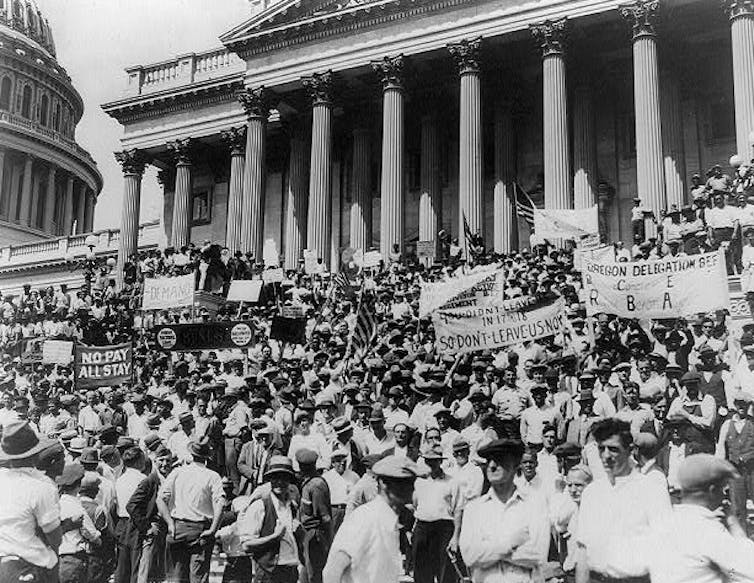 The Bonus Army stages a demonstration at the empty Capitol on July 2, 1932.
The Bonus Army stages a demonstration at the empty Capitol on July 2, 1932.
(Underwood and Underwood, photographers; Library of Congress)
By James N. Gregory
University of Washington
 An election looms. An unpopular president wrestles with historic unemployment rates. Demonstrations erupt in hundreds of locations. The president deploys Army units to suppress peaceful protests in the nation’s capital. And most of all he worries about an affable Democratic candidate who is running against him without saying much about a platform or plans.
An election looms. An unpopular president wrestles with historic unemployment rates. Demonstrations erupt in hundreds of locations. The president deploys Army units to suppress peaceful protests in the nation’s capital. And most of all he worries about an affable Democratic candidate who is running against him without saying much about a platform or plans.
Welcome to 1932.
I am a historian and director of the Mapping American Social Movements Project, which explores the history of social movements and their interaction with American electoral politics.
The parallels between the summer of 1932 and what is happening in the U.S. currently are striking. While the pandemic and much else is different, the political dynamics are similar enough that they are useful for anyone trying to understand where the U.S. is and where it is going.
Tanks and mounted troops advance to break up a Bonus Marchers’ camp of veterans protesting lost wages, Washington, D.C., July 28, 1932. (PhotoQuest/Getty Images)
Multiracial Street Protest Movement
In 1932, as in 2020, the nation experienced an explosion of civil unrest on the eve of a presidential election.
The Great Depression had deepened through three years by 1932. With 24% of the work force unemployed and the federal government refusing to provide funds to support the jobless and homeless as local governments ran out of money, men and women across the country joined demonstrations demanding relief.
Our mapping project has recorded 389 hunger marches, eviction fights and other protests in 138 cities during 1932.
Although less than the thousands of Black Lives Matter protests, there are similarities.
African Americans participated in these movements, and many of the protests attracted police violence. Indeed, the unemployed people’s movement of the early 1930s was the first important multiracial street protest movement of the 20th century, and police violence was especially vicious against black activists.
Atlanta authorities announced in June 1932 that 23,000 families would be cut from the list of those eligible for the meager county relief payments of 60 cents per week per person allocated to whites (less for blacks). A mixed crowd of nearly 1,000 gathered in front of the Fulton County Courthouse for a peaceful demonstration demanding $4 per week per family and denouncing racial discrimination.
The biracial protest was unprecedented in Atlanta and yielded two results. The eligibility cuts were canceled, and police promptly hunted down one of the organizers, a 19-year-old black communist named Angelo Herndon. He was charged with “inciting to insurrection,” a charge that carried the death penalty. Lawyers spent the next five years winning his freedom.
Protests Over Unemployment
Hundreds of unemployed “Hunger Marchers” protest on Boston Common on their way to the State House, demanding unemployment insurance and other relief measures, May 2, 1932. (Bettman/Getty)
But race was not the key issue of the 1932 protest wave. It was government’s failure to rescue the millions in economic distress.
Organizations representing the unemployed – many led by communists or socialists – had been active since 1930, and now in the summer of 1932 protests surged in every state. Here are examples from the Mapping American Social Movement Project timeline from one week in June:
• June 14
Hundreds of Chicago police mobilize to keep unemployed demonstrators at bay at the start of the Republican Party nominating convention.
• June 17
A so-called “hunger march” of 3,000 jobless in Minneapolis ends peacefully, but in Bloomington, Indiana, police use tear gas on 1,000 demonstrators demanding relief, while in Pittsburgh unemployed supporters crowd a courthouse to cheer the not-guilty verdict in an “inciting to riot” case.
• June 20
Police break up a march by 200 unemployed in Argo, Illinois, and a much larger protest by jobless in Rochester, New York. In Lawrence, Massachusetts, 500 protesters successfully demanded an end to evictions of unemployed mill workers; in Pittsburgh, protesters block the eviction of an unemployed widow. The same day in Kansas City, a mostly black crowd of 2,000 pleads unsuccessfully with the mayor to restore a recently suspended relief program.
Farmers’ Uprising
The unemployed protests in urban areas of 1932 seem similar to today’s protest culture, but that was not true in the farm belt.
Dealing with collapsing prices and escalating farm evictions, farmers in many regions staged near-uprisings. Black farmers in the cotton belt braved vigilante violence when, by the thousands, they joined the Alabama Sharecroppers Union, which advocated debt relief and the right of tenant farmers to market their own crops.
Newspaper headlines focused on the white farmers mobilizing in Iowa, Wisconsin, Nebraska, Minnesota and the Dakotas in the summer of 1932. The Farmer’s Holiday Association formed that year pledging to strike (“holiday”) to raise farm prices. The strike that began on Aug. 15 involved sometimes heavily armed white farmers blocking roads to stop the shipment of corn, wheat, milk and other products. The strike withered after a few weeks, but farmers had sent a message, and some state legislatures quickly enacted moratoriums on farm foreclosures.
Counties that today are marked as Trump territory distinguished themselves in 1932 as centers of what became known as the “Cornbelt Rebellion.”
Farmers set up a roadblock near Sioux City, Iowa, during Farmer’s Holiday Strike, August 1932.
(State Historical Society of Iowa)
Unrest Helped FDR Defeat Hoover
Periods of grassroots protest and civil unrest interact in unpredictable ways with presidential elections. In 1932, unrest helped Franklin Roosevelt defeat incumbent Herbert Hoover. Again, there are similarities between that summer and this one.
Democratic presidential candidate Roosevelt, like today’s Democratic candidate, Joe Biden, enjoyed the luxury of running on platitudes instead of programs. Roosevelt used the phrase “new deal” in his nomination acceptance speech, but details were few and it was not until he took office that the phrase acquired real meaning.
Roosevelt could avoid commitments because the political dynamics of 1932 forced the incumbent to play defense, much like today.
Herbert Hoover was no Trump, almost the opposite. Cautious, principled, quiet, a moderate Republican, he had made major errors in the first years of the Depression, and his reputation never recovered. Democrats accused him of inaction (which was not true), while the unemployed movements fixed the label “Hoovervilles” on the homeless encampments and shacktowns that sprang up in cities across the country.
Hoover’s credibility was further damaged in the summer of 1932 when more than 15,000 World War I veterans converged on Washington, D.C. under the banner of the Bonus Expeditionary Force, commonly called the Bonus Army. They demanded that Congress immediately pay them the bonuses they were due to get in 1945.
When the Senate rejected the proposal, the Bonus Army settled into a massive encampment across the Anacostia River from Capitol Hill.
Shacks burned by the U.S. Army in the shantytown constructed by protesters called the ‘Bonus Army’ after they were forced out by the military. (Bettmann/Getty)
A month later, Hoover called in U.S. Army troops. During a night of violence, the army burned thousands of tents and shacks and sent the Bonus Army marchers fleeing.
For Hoover, the deployment of U.S. Army units played out much as it did for Trump this May, when he had Lafayette Park violently cleared of protesters. Hoover’s action deepened his image problems and strengthened the sense that he lacked compassion for those in need, including those who had fought for their country only 14 years earlier.
Hoover tried to mobilize a backlash against the summer of protests, claiming that Communists were behind all of the unrest, including the Bonus Army, which in fact had banned all Communists. It didn’t work: Roosevelt won in a landslide.
The poor handling of the unrest and economic crisis by President Hoover, right, led to his election loss to Roosevelt, left. (Roosevelt: Hulton Archive/Getty Images; Hoover: General Photographic Agency/Getty)
In the end, the protests helped Democrats in the election of 1932. In Congress, Democrats gained 97 House seats and 12 in the Senate, taking control of Congress for the first time since 1918. And equally significant, they helped propel the agenda of the New Dealers, as the new administration prepared to take power and launch the ambitious legislation of the first 100 days.
Three years of grassroots action had forced even reluctant politicians to recognize the urgency of reform. The early New Deal would race to provide debt relief for farmers and homeowners, jobs for the unemployed, and public works projects – part of what demonstrators had been demanding for years.![]()
James N. Gregory is a professor of history at the University of Washington.
This article is republished from The Conversation under a Creative Commons license. Read the original article.
Please Contribute on
Consortium News’ 25th Anniversary
Donate securely with  PayPal here.
PayPal here.
Or securely by credit card or check by clicking the red button:

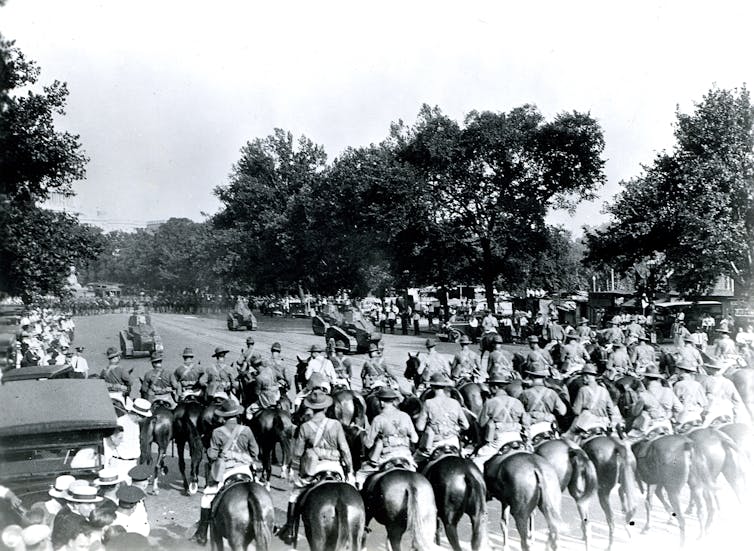
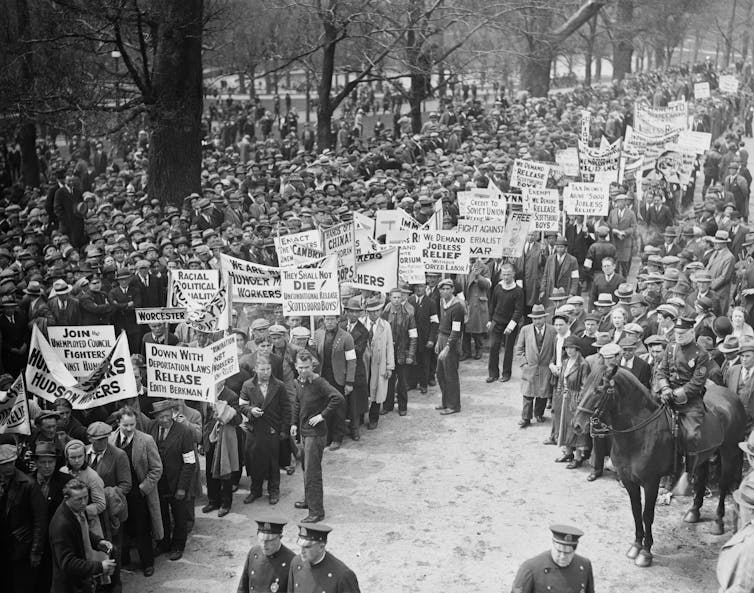
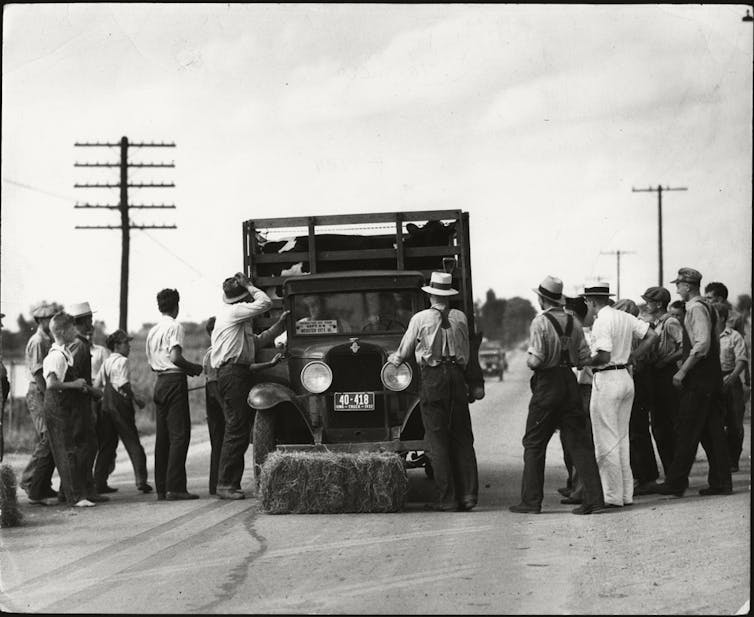
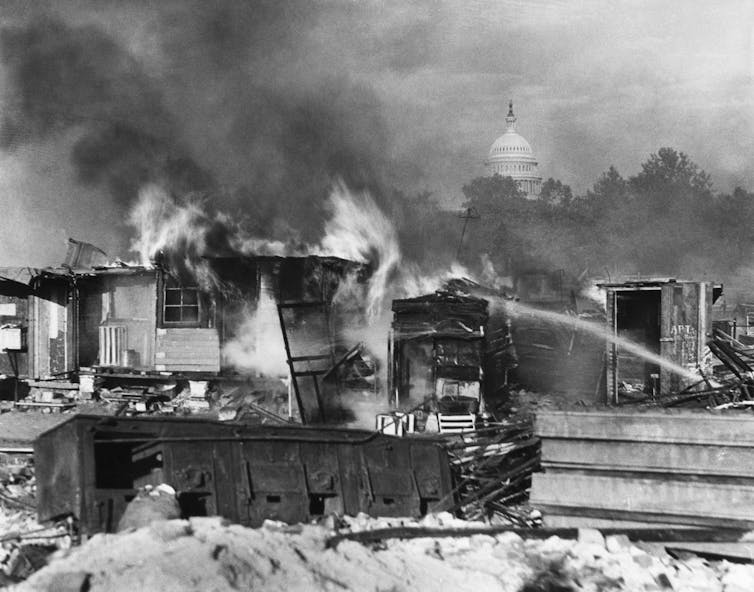
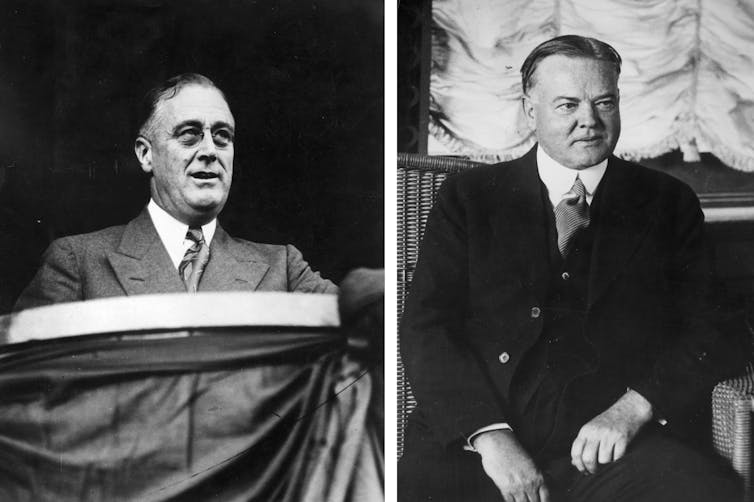
While this article is certainly an interesting history lesson, aand the movement taking project a valuable undertaking, no non-Trump voter and certainly leftist with a conscience and a middling understanding of how the annals of power work in this country can defensibly cast a vote for Joe Biden. While Trump is unlikeable and a loose cannon, 8 years of a nominee installed by flagrant party corruption and election fraud followed by 8 years of his shitty VP would spell the collapse of the U.S. as we know it. The bi-partisan neoliberal hegemon MUST end immediately if we are even to have a planet to live on after 2030. The only way to do that is by hringing down the Democratic party. Epic losses all the way down the ballot are what is required to get the neoliberal corporate warmongers in the party leadership out of our way so that a vacuum for progressive policy is finally created. Everyone needs to get over the myth that grassroots movements will “pull the party left.” If that were at all true, Bernie Sanders would be the president already. Revolutions require sacrifice, and revolt against oppressive systems is a moral imperative. To have any hope of creating a successful system to replace the current one, we have to be willing to deal with the next 4 Trump years and use them to increase the degree of populist uprising and leftist movements. The Democrats would never allow that. Liberals will go back to sleep believing the big bad wolf is dead and their Wall St. investments are saved, and the censorship of the national security state implemented by the Obama administration would increase a thousandfold. No, the Professional Managerial Class needs to feel the pain of not getting what they want for once, and we need to assist in making sure the Trump presidency directly affects the things they care about in the most disruptive possible way. Then, and only then, will they have shared in the suffering enough to gove a shit about doing something differently.
I agree with most comments here about Biden being no FDR. However, if something happens that could propel Sanders back into contention, we might have a 21st century New Deal after all.
I know, I know, hope springs eternal from the human breast …..
How does the author manage to characterize Biden as “affable”, after numerous video captured arguments with common Americans asking routine questions of Biden on the campaign trail pre-Covid? Or, in the context of Biden having been a ‘wheel’ in driving Dem Party consent to join with Republicans and attack Iraq on what was obviously questionable ‘intelligence’? From what I can see he’s your typical old while male who doesn’t like even the appearance of a challenge to his past conduct.
Today’s unrest is no comparison to the unrest of 1932. Wall Street has much more power today and there is no October 1929 in sight.
Every time there is a deep recession oligarchs are winning. This is not the capitalist world of 1932. Now we have predators of a worldwide hunting era. The unrest is not only American. it is also France (yellow vests) and other nations of the western “democracies” to a less important extent. Biden will be manipulated from “behind” I mean the deep state. Never was the “deep state” so powerful because of its big budget and its mushroom field (private security agencies) are working relentlessly to keep the status quo in operation. The American citizen can install Bernie in the White House, if they are united and carry him (physically) to the throne. This is people’s power. Elections are rigged heavily, also in the USA. We have witnessed such scandals more than often in the Land of the Free.
And FDR only did what he did because he recognized all too clearly that if he didn’t institute the “New Deal” – as he himself said – that would be the end of American capitalism. And we couldn’t have that, now could we (We being the corporate-greed ridden capitalists of that day)?
And because a goodly proportion of the “Democrat” Party in fact and in Congress was southern and up to the necks in support of Jim Crow, lynching and all those barbarisms, much of the pro-working class (to keep ’em quiet) legislation did not include African Americans – particularly Social Security (agricultural and domestic workers deliberately excluded from inclusion).
FDR did some decent things for the working classes (well, most of them) and he was an intelligent, well-spoken man of pleasant demeanor. But he most certainly would not have changed anything in the way the US functioned – deeply pro-capitalist anti worker (not a few killings of strikers over the years prior) – had it not been for the peculiar circumstances into which he was catapulted as prez. Of course, he needn’t have sought the presidency….
Trump won on a protest vote, against an unpopular candidate.
Biden will win as a protest vote against Trump.
History repeats itself except Biden is no FDR.
Just the fact that the choices of candidates are insults to anyone of intelligence, a comparison between Herpes and Syphilis is the prequel to an Empire in its death knell.
Rome is vaporizing.
Good Riddance!
So that means we’re gonna get Biden and a Democratic Senate in a few months? Oh Goodie!!
“…and I call that a lose lose”
– Lose Lose – Tommy Castro & The Painkillers
The problem here is that there aren’t any FDRs on the Horizon. The Demented Death Rattle on the Democrat Ticket is the Antithesis of FDR.
This is true, and we spent the past quarter-century trying to educate middle class liberals on this fact. It proved to be a lost cause. Most of the progress of the former Democratic Party, from FDR until the takeover by the Clinton “New Democrat Party,” was reversed. Democrats took the lead as the regressive, pro-war/anti-poor party. The Obama years were the last chance to salvage the (comparatively) progressive Democratic Party, but it turns\ed out that there was little interest in doing that. And this, folks, is how “Russia stole the election!”
I concur. Unlike Franklin Roosevelt, Biden is a right-wing extremist, serial sexual predator, war criminal, and completely lacking in empathy. Roosevelt was human enough to feel compassion for the less fortunate and wise enough to understand that if he didn’t do something to alleviate the crushing poverty in the U.S., the nation might have its own Bolshevik revolution, and he was not about to allow that.
Biden, even if he were possessed of all his faculties (he isn’t), is so stupid, elitist, and out of touch that he would have no problem whatsoever cracking down on protests as violently if not more so than Drumpf, even as he cuts desperately needed services such as Social Security, Medicaid, Medicare, TANF, and SNAP.